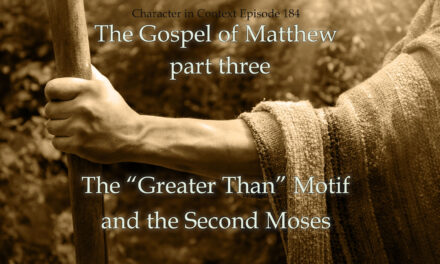Can the Bible be understood literally? At face value? Was it meant to be understood that way and what does that even mean? This week, we will talk about communication and how figures of speech (anthropomorphisms, metaphors, and similes) have to be accepted on their own terms so that we don’t misunderstand the intention of the passages.
If you can’t see the podcast player, click here.
Hi, I am Tyler Dawn Rosenquist and welcome to Character in Context, where I usually teach the historical and ancient sociological context of Scripture with an eye to developing the character of the Messiah. But not right now, right now I am doing a series about how to not waste your time with bad study practices, bad resources, and just the general confusion that I faced when I started studying the Bible and was trying to figure out what to do and whose books I should read. Bottom line, I read a lot of nonsense and spent a ton of money on it. I am going to give you some basics on how to avoid a lot of the pitfalls, save money, maximize your time and effort, and get the most out of what you are doing.
Master book list can be found here and I will add to it as needed.
Well, this episode is going to be a ton of fun—at least for me. And it might be very challenging for you, or not, so just bear with me and hear me out. People love to say that they take the Bible literally, at face value, and that they believe absolutely everything it says. Now, if we take the first part of that—taking the Bible literally would actually mean using the real or original meaning, which is what we’ve been talking about. Poetry has to be read differently than narrative which has to be read differently than a proverb or an apocalypse. Everyone would agree with that. Beyond that, it isn’t always easy, even when knowing that we are reading poetry or a narrative, to understand the real or original meaning—God’s intention in communicating a message through human beings. We’ll get back to that in a bit because when people say “literally” that’s generally not what they mean. What they mean is that they are taking the Bible word for word, claiming that they are believing what the plain text says. The problem is that no one really does that, nor should we; because the Bible is literature, written in foreign languages, with some words that don’t even exist anymore (hence, we can only guess at the meaning from the context in which we find them), to people with an entirely different world view, who used different idioms and had different ideas about the world and the human body and how things worked, and makes glorious use of metaphors and allegories and parables and puns and all sorts of colorful language that cannot ever be understood “word for word,” any more than our own modern literature can.
So, people who claim to take the Bible literally get themselves into trouble when the Bible collides with what is obviously true—and when challenged, will then claim that such and such is a “metaphor” or an “idiom” and sometimes it is and sometimes it isn’t. But when they make that admission, they are inadvertently owning the plain fact that no one can believe what the Bible programmatically says “word for word.” It doesn’t work that way and it never has and it can’t. And God didn’t give it to us that way. Is that to say that nothing in the Bible can be understood word for word? Of course not, but it all depends on what we are reading and how that type of literature functions. If we take Revelation or certain parts of Daniel as being, word for word, something that did or will happen with fantastic beasts and mountains being thrown into the ocean, we’ll be butchering the text. And I don’t know of anyone who does this—we know that Revelation and Daniel are both symbolic when they paint these elaborate pictures. Well, maybe not Tim LaHaye because he definitely wrote those lady-headed hornets as real in his books.
I am going to teach you three words this week that I will use a lot so that you can know them. They’re actually pretty useful and extremely important to understand—and not just when reading the Bible. They are important on social media as well. The first word is locution, and it means the way something is communicated. I am locuting this by first typing it out, and then I will locute it again by speaking it and recording it. If you read the transcript, you will be receiving this as a written text and if you listen, you will receive it as an oral text. Locution is how you are given a message—out loud, in writing, or in sign language. Locution is how I decided to give you the message. If you are a Star Trek fan, when Jean-Luc Picard was captured by the Borg and turned into a drone, his name was Locutus of Borg and the reason for that name is that the Borg was speaking through him. He was their chosen method of communication. Locutus was their locution.
A word that is similar is illocution, and this one is much easier to understand. Illocution is the intention of the author or speaker. So, if I am not clear in what I write or say, in my locution, then you will not understand my intention, my illocution. Hello, Epistles of Paul! As Peter said, some of the things that Paul wrote, his locution, were hard to understand and so people would twist what he said, as if his intentions, his illocution, was something else entirely. I have a silly way of remembering this. If I am communicating something to you with ill-will, then you are going to get a nasty letter and you will know that my illocution was hostile. It was my intention to let you know that I am not happy with you. The third word is perlocution. Yeah, I know, I wish they weren’t all so alike too. Perlocution is the effect that my words have on you. I made up the mantra, “Bad perlocution can result in persecution”. So, Locutus, ill-will, and persecution are my memory aids.
Let’s do this. Paul wasn’t always clear with his locution and so people often misunderstand his illocution, which led to some pretty disastrous perlocution. This is why there is so much confusion on Paul’s stance on women teaching. On one hand, you have all the occasions where he is clearly allowing and supporting it and then we have the two verses where it seems like he doesn’t. What was his illocution, his intention—did he allow and encourage women to teach, or only in certain cities where the culture could support it? His locution, what he said, isn’t entirely clear and so the perlocution has historically been a general ban on women teaching in the church. But as we become more educated in the context of Paul’s letters and the first century in general, many are questioning if we were wrong about Paul’s illocution, what he was trying to say, and if our perlocution, its effect on us and our response, has been wrong.
The whole point of this is to go back to the beginning of today’s lesson. If we are going to take the Bible literally, it requires knowing the real or original meaning and acting on it appropriately. And sometimes we just don’t know and have to do our best while relying on the Spirit. And that should make us incredibly humble with the Bible—it should, but usually we just set up camps and fight as though the Bible is easy to understand. And some people claim it is easy to understand—but then teach us their take on it anyway. Which, when you think of it, is kinda strange.
What about taking the Bible at face value? That creates even more problems because the Bible isn’t a modern book and it doesn’t play by our rules. The authors were interested in telling the truth about God, not about everything being painfully accurate. There are parts of the Bible that disagree with each other and some people try to fudge what the Bible says to make everything agree because we think that accuracy is the same as truth when it absolutely isn’t. The Gospels like to tell the same story four different ways, with facts somewhat different, in order to make true points. This is not only how ancient Judaism communicated, but all of the ancient world. I can tell you the truth by telling you a parable, but my parable won’t be an accurate story. You can’t take it at face value as though Lazarus was a real person who is now resting in the bosom of Abraham while the rich dude who ignored him can see him across the chasm and is still whining for water. But some people have created doctrines of heaven and hell based on it, assuming that we can take it at face value. But they don’t even try to do that with the Parable of the Sower or the Parable of the Prodigal Son because they are obviously just stories and not mini-documentaries. If we take the Bible literally, according to its real or original meaning, we can’t treat parables differently than the original audience would have.
What about descriptions of the earth, or our bodies, or about Yahweh’s appearance or gender? If we are taking the Bible at face value, and many are doing that when it comes to the shape of the earth, we have to say that the earth is flat, surrounded by mountains that hold up a solid dome, with water above the dome and water beneath the earth, and that the earth is held up by literal pillars. I have no idea what the pillars are supposed to be resting on. Now, some people will say these are just metaphors (saying the earth is one thing when it is actually another) but we know from archaeology that everyone in the ancient world believed this. It isn’t a pagan belief, it’s a pre-scientific mythological belief. Although people associate the word mythology with stories of gods and goddesses, a myth is really just a story explaining something that cannot be explained—yet. That’s why all the nations had stories about why it doesn’t rain in the summer—the Babylonians thought that Tammuz was locked away in the underworld for half the year, not dead but imprisoned—or how the sun gets across the sky and where it goes at night. They were exceedingly intelligent and clever in what they came up with. It isn’t too hard to understand why they looked for reasonable answers in both their own architecture and what they could understand up close—and how they made assumptions about things that were far away and mysterious. It wasn’t pagan, it just wasn’t scientific. They were too busy trying to survive. Science is performed by people with time on their hands and plenty of food and adequate shelter.
But there are people who are using the Bible to divide the Body based not on what is and is not sinful, not Christ and Him crucified—but based upon what a person does or does not believe about the shape of the earth. The Bible was written to reveal God and His rescue plans for humanity, our journey back to Eden to dwell with Him forever as He intended at the beginning. Teaching science would have been a waste of paper, but He is so wise and compassionate that He used what they thought they knew in order to teach them truths about Himself. God still meets us where we are and I can assure you that if He decided to teach science to us that we still wouldn’t understand it. As a scientist, let me assure you that we don’t know all that much still.
Other passages assure us that we think and feel from the neck down—our brains having nothing to do with it. And that is exactly what the entire world believed until about 500 BCE, when the Greeks figured out that the Egyptians had made a big mistake by removing the “useless” brains from their mummies—thinking they could do all their thinking and feeling with the hearts, bowels, and kidneys. This is actually why, in those old movies, mummies want people’s brains. Seriously, studying canopic jars is a real eye opener. And seeing ones that are still sealed is hecka creepy and cool. When we come to the Gospel accounts, Yeshua/Jesus changes up the Shema to reflect this change of understanding and he included the command to love Yahweh with all of our minds in addition to the rest of us. Why? Because His audience knew that thinking is done with the brain and not the heart. Were these metaphors? Nope, this was primitive science based entirely upon some bad and some clever assumptions. These reflected actual beliefs until they were later proven wrong. And that’s okay that God wasn’t acting like a PhD in kindergarten making sure the kids are burdened with the concept of negative numbers. God isn’t boorish, He meets us where we are. If you’ve ever been around someone who would rather show off what they know than teach people, you totally understand what I am talking about.
But figures of speech are what I wanted to discuss and truly, the best way is to talk about how Scripture portrays Yahweh—and apart from assertions about His character, the authors were forced to deal in humanization and metaphors in order to give us ideas about how to relate to Yahweh and how He wants to relate to us. I mean, let’s be honest here—He is entirely ineffable and His being is inexpressible; those are fancy words meaning that we are incapable of imagining or describing how He really is. We are crippled by limited intellect (meaning we are too stupid) and human languages (which can only describe things that we actually understand) that are completely incapable of capturing Yahweh or pinning down His absolute nature. We just are. And so, we must cling, cleave, remember His works, trust and love Him. We have no other choice, unless it is to decide to run the opposite direction from anything we just can’t fit into a box. Scripture says that He is seen and unseen, invisible and yet the Bible is full of anthropomorphic descriptions of Him. Anthropomorphic is simply a word that means giving humanish descriptions to something else. Anthropos is the Greek word for human, and morphe is the Greek word meaning “in the form or shape of” so when we anthropomorphize anything, we describe it as having human characteristics even though it is not human.
First off, can we agree that Yahweh is not a human being? That He isn’t just a more evolved form of us or that we are a less evolved form of Him? Can we agree that He isn’t built with DNA like we are (where would that DNA even come from?) and doesn’t have what we would call a genetic makeup? After all, Yahweh can’t be “all in all” if He is limited by our biological realities. And He would need DNA to have gender—but He knew that He needed a way to be real to us. We are largely incapable of understanding anything or anyone that doesn’t have a physical form. I mean, I am a chemist and it is hard enough for me to wrap my mind around waves and waving particles and energy and all that—I simply accept it. We know they are there because of what they do and we can also perceive God by what He does. But they couldn’t conceive of anything making things happen without a physical reality. This is why they fashioned idols in the ancient world—because the substance of the gods needed to be fed or they would starve to death. Yahweh, being non-physical, has no physical needs.
This is why He spent so much time stressing this to them, and outlawing idols and it was very difficult for them to understand for a very long time. Heck, we can hardly deal with it ourselves and so there are a lot of depictions of Yahweh as an old white guy. And He understands this about us, so He chose to place the fullness of His being in the Son, Yeshua so that He could tangibly show us what He is like. But before that, He had to break them of thinking of Him like the other gods who were male and female and sometimes half human/half animal. To a patriarchal society, Yahweh presented Himself functionally as a father and yet elsewhere we see, “God is not a man, that he might lie, or a son of man, that he might change his mind.” (Num 23:19, CSB). Yahweh is big on communicating how He relates to us but we take it too far when we make Him like us. He is nothing like us—if He was then we wouldn’t be a creation. He wouldn’t have to create man because man would already be pre-existent in Himself. God also identifies functionally as a mother, and yet is not female either. God smelled the sacrifices and was soothed, and yet He has no nose, He sees things without eyes and hears things without ears, reaches out His hand when He has no hands and turns His face against evil despite not having a face–yet He speaks through these images that liken Him to a human being, taking on roles that we can relate to even though they can also give us the wrong ideas about Him when taken out of context. Remember, Yahweh spent a long time breaking us of the idea that He was a physical being before He was able to come to us in human form. If He had done it right away, we’d still be worshiping idols with no way to break us of it.
We tend to think of things in terms of form but in the ancient world, they were all about functionality—so Yahweh takes on the function of a father, and a mother, and a husband, a shepherd, so that we can think of those roles. In a single verse, Deut 32:19, He is described as a Rock who is a father and also as the one who birthed them. Many of these are metaphors, as when Yahweh is called a Rock, a Shepherd, a Shield, a Fortress, and for that matter, we are called sheep, goats, unruly cattle, clay, etc. This is very different than a comparison or a simile when someone or something is said to be like, or as something else. The Bible accomplishes this description of functionality through the use of metaphors, which is comparing two things without using the word like or as. It is a more jarring form of comparison. We know that Yahweh isn’t actually a rock but functionally, we can trust in Him because He cannot be moved. We know that we aren’t actually the genetic offspring of Yahweh, and we know that He didn’t give birth to us, even though the plain reading of the text says otherwise. We know that we aren’t actually sheep, goats, or unruly calves and He doesn’t spend His days and nights leading us around to find grass. He isn’t made of iron or brass so that we can hold Him in front of us to block the arrows of our enemies, which aren’t actually arrows either—hopefully. His Name isn’t constructed of rock and mortar so that we can physically take refuge in it like an actual Tower. However, these metaphors are gifts that He has given us so that we can know what to expect from Him and so that we can begin to understand His character. Of course, not every description of Him is metaphorical. He literally is our Creator, Provider, and Savior.
Yeshua was big on using similes, which are a bit different. He would say, “The Kingdom of Heaven is like…” a sower, a mustard seed, a woman leavening her batches, treasure, a merchant in search of fine pearls, a large net thrown into the sea, a landowner who hired workers for his vineyard, ten virgins, a king who gives a banquet for his son, you get the picture. And then Yeshua would tell a parable and give them a puzzle to figure out His meaning. Parables were designed to produce both deep thought and confusion—to get people really thinking about the Kingdom of Heaven and how it might be entirely different than they had previously believed. And He had similes to describe us as well—“to what can I compare this generation?” Are we like children sitting in the marketplace demanding that everyone dance to our tune? Or are we like fools who build a house upon the sand or wise men who build upon a rock, sheep among wolves, wise as serpents, gentle as doves, sheep without a shepherd, or whitewashed tombs? Similes are incomplete comparisons. If someone says, “You are a jerk,” they are not meaning it as a metaphor or a simile—they aren’t comparing you to a jerk, they are telling you that’s what you are. And so we have to navigate statements made in Scripture with wisdom. Some are meant in a “face-value” way and others are comparisons. There is no one single rule to follow. We have to be intelligent readers and it isn’t easy sometimes.
What happens when we don’t recognize figures of speech? We can come to some misguided opinions. How about, “Dear friends, don’t overlook this one fact: With the Lord one day is like a thousand years, and a thousand years like one day.” (2 Peter 3:8) We have people interpreting this not as a simile, despite the two-fold usage of “like” but as an equivalency. But Peter, Paul, and the others expected Yeshua to come back fairly quickly and it is unlikely that Peter here is prophesying a literal timeline—he’s making reference to another simile in Psalm 90. In context, Peter is dealing with those who are scoffing because Yeshua hasn’t already come back. And his simile simply reflects that Yahweh’s timetable doesn’t look like ours. It isn’t necessarily a formula, but an incomplete comparison. Time works differently from Yahweh’s perspective. What seems urgent to us is something He takes His time to work on. How about when Jesus said, “For in the resurrection they neither marry nor are given in marriage but are like angels in heaven.” In context, this was entirely about marriage in the world to come and in that respect, we will be like the angels but many people look at that and, again, make it an equivalency—that we will be angels but we and the angels both are simply different sorts of created beings. It’s really important to understand what we are reading.





















